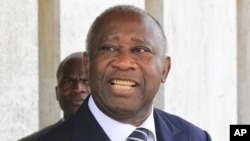Ivory Coast's incumbent president is expected to address the nation, possibly as early as Thursday, about African Union demands that he hand over power to the internationally-recognized winner of November's presidential election. The country's political crisis has driven more than 75,000 refugees across the border into Liberia.
United Nations officials and regional diplomats in Abidjan say incumbent president Laurent Gbagbo is expected to make a televised response to African Union calls for him to leave office.
The African Union last week endorsed former Prime Minister Alassane Ouattara as Ivory Coast's duly-elected president, joining the Economic Community of West African States, the European Union, the United Nations, and the United States in calling on Gbagbo to step down.
National unity government
In keeping with that African Union endorsement, Ouattara is now offering a national unity government, a truth and reconciliation commission, and a combined armed forces in what he says is Gbagbo's "last chance" to end this political crisis peacefully.
Gbagbo has rejected all previous attempts to force him from office. Hamadoun Touré is a spokesman for the U.N. mission in Ivory Coast. He says there is great uncertainty ahead of Gbagbo's response to Ouattara's offer.
"He offered him a way out in I would say a decent manner,” Touré said. “Is he going to accept it or not? It is hard to say. So far he has refused all calls for him to step down. So I don't know how it is going to be solved this time again."
Situation deteriorating
Toure says the humanitarian situation in Ivory Coast is deteriorating as the Gbagbo government has refused U.N. requests for safe passage of relief supplies to more than 300,000 internally displaced civilians.
"We cannot access the people in need,” Touré added. “We cannot help them. They are scared. They are in a very bad condition. So the humanitarian situation is very, very worrisome."
Refugees
U.N. officials say the political crisis has also driven more than 75,000 Ivorian civilians across the border into Liberia, with half that total arriving in just the last two weeks. Aid officials in Liberia's Toe Town say they are struggling to keep up. Augustine Nugba is the local program coordinator for the Catholic charity Caritas.
"As soon as the place is given and we receive the government's okay, we will start to construct a camp and to remove everyone from here," said Nugba.
Food shortages, overcrowding, and inadequate sanitation have brought cases of diarrhea and malaria for refugees, including Victorine Tohogninon.
Tohogninon says that since the refugees came to Liberia, the children and the elderly are getting sick.
She says the refugees are getting water and food, but the bulgur wheat being provided is not what they are accustomed to eating, so many people have diarrhea.
It is a long and poorly defended border along the Cestos River. So far, fighting in Ivorian border towns between rebels who back Ouattara and government troops who are still loyal to Gbagbo has not spilled into Liberia, though human rights groups say both sides are recruiting Liberian fighters.
If the political crisis is not resolved soon, refugee Charles-Camille Kpehia says there will be no one left in Ivory Coast to govern.
He says whoever the people want, that's the person who should lead the country. No one can say, 'I will get rid of everyone.' Is it the goats, chickens and cattle that such a person will lead?
Gbagbo to Address Ivory Coast on AU Call to Cede Power




